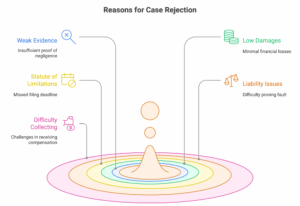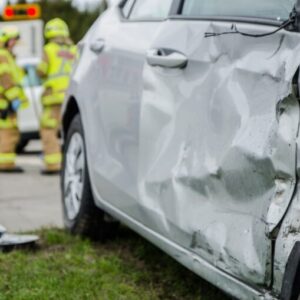Finding yourself injured due to someone else’s carelessness can be overwhelming. You might consider hiring a personal injury lawyer to help you get compensation for your medical bills, lost wages, and pain and suffering. But what happens if that lawyer turns down your case? It can be disheartening and leave you wondering why. The truth is, there are several legitimate reasons why a personal injury lawyer might decline to represent you. Let’s explore those reasons.
Understanding Personal Injury Cases: Negligence and Damages
At the heart of almost every personal injury claim lies negligence. In legal terms, negligence means someone failed to act with the reasonable care that a prudent person would exercise under similar circumstances, and that failure resulted in your injuries. Think of a driver texting behind the wheel who rear-ends another car, or a store owner who doesn’t clean up a spill, causing someone to slip and fall.
To win a personal injury case, you must prove these key elements:
- Duty of Care: The other party had a legal responsibility to avoid causing you harm.
- Breach of Duty: They failed to meet that responsibility.
- Causation: Their failure directly caused your injuries.
- Damages: You suffered actual harm as a result (medical bills, lost income, pain, etc.).
Damages are the monetary compensation you seek to recover. This can include:
- Medical Expenses: Bills for doctor visits, hospital stays, physical therapy, medication, and future medical care.
- Lost Wages: Income you lost due to being unable to work.
- Pain and Suffering: Compensation for the physical pain and emotional distress you’ve experienced.
- Property Damage: Cost of repairing or replacing damaged property, like a car.
Calculating damages isn’t always straightforward. For example, pain and suffering are often calculated using a multiplier (typically between 1.5 and 5) applied to your medical bills. The more severe and long-lasting your injuries, the higher the multiplier. Economic damage, such as lost wages, can often be calculated more directly.
Reasons a Personal Injury Lawyer Might Reject a Case
A personal injury lawyer’s decision to accept or reject a case hinges on several factors. They need to assess the likelihood of winning the case and whether the potential recovery justifies the time and resources required. Here are some common reasons for rejection:
- Weak Evidence of Negligence: As mentioned, proving negligence is crucial.
- Low Damages: If your injuries are minor and your financial losses are minimal, a lawyer might not find it economically viable to take your case.
- Statute of Limitations: Every state has a time limit (called the “statute of limitations”) for filing a personal injury lawsuit. Missing this deadline means you lose your right to sue. In most states, this is two years from the date of injury. Be sure to check your local statute of limitations, as these laws are subject to change.
- Clear Liability Issues: If it’s difficult to prove the other party was at fault, or if you were partially at fault, a lawyer might be hesitant.
- Difficulty Collecting Damages: Even if you win your case, you need to be able to collect the money. If the at-fault party has limited assets or no insurance, collecting can be challenging.

Lack of Sufficient Evidence to Prove Negligence
One of the biggest hurdles in a personal injury case is proving negligence. A lawyer needs solid evidence to demonstrate that the other party acted carelessly and caused your injuries.
What constitutes sufficient evidence?
- Police Reports: These reports provide an official account of the incident, including witness statements and the officer’s opinion on who was at fault.
- Witness Statements: Eyewitness testimony can be invaluable in establishing thee facts of hat happened.
- Photos and Videos: Photos of the accident scene, your injuries, and any property damage can provide strong visual evidence. Surveillance footage can also be helpful.
- Medical Records: These documents detail your injuries, treatment, and prognosis, all of which are linkedto the accident.
- Expert Testimony: In some cases, expert witnesses (such as accident reconstruction specialists or medical experts) are needed to explain complex issues and establish causation.
What is considered insufficient evidence?
- Hearsay: Statements made outside of court that cannot be verified.
- Speculation: Guesswork or opinions without supporting facts.
- Missing Police Report: Especially in traffic accidents, a police report is necessary to assign fault.
- Lack of Medical Documentation: Without proper medical records, it’s difficult to prove the extent and cause of your injuries.
Evaluating the Severity of Damages in Personal Injury Claims
Insurance companies play a crucial role in personal injury cases. They evaluate claims based on the damages incurred. If your damages are relatively low, the insurance company might offer a small settlement, and a lawyer might not see enough potential recovery to justify their involvement.
For instance, if you slipped and fell in a store, but only suffered minor bruises and missed a few days of work, your damages might be limited to a few hundred dollars. In contrast, if you suffered a severe spinal cord injury requiring extensive medical treatment and resulting in permanent disability, your damages could be in the millions.
The Role of Personal Injury Law in Assessing Liability
Liability refers to legal responsibility for the harm caused. Even with strong evidence of negligence, proving liability can be a complex process. The burden of proof lies with the injured party (the plaintiff) to demonstrate that the other party (the defendant) was responsible. This often requires a careful analysis of the facts, applicable laws, and legal precedents.
For example, even if a driver was texting while driving, you must also prove that the texting directly caused the accident and your injuries. If the other driver claims they were distracted by something else entirely, establishing the link between the texting and the accident becomes more challenging.
Furthermore, the concept of comparative negligence can impact your ability to recover damages. Comparative negligence occurs when the victim is also found partially responsible for their injuries. For example, if a pedestrian is hit by a car while jaywalking, they may be found partially at fault, which can reduce the amount of compensation they can recover.
What to Do If a Personal Injury Lawyer Rejects Your Case
If a personal injury lawyer rejects your case, don’t give up immediately. Consider these steps:
- Ask for Feedback: Ask the lawyer why they rejected your case. Understanding their reasoning can help you address any weaknesses.
- Gather More Evidence: See if you can strengthen your case by collecting additional evidence, such as witness statements, photos, or expert opinions.
- Seek a Second Opinion: Consult with another personal injury lawyer. Different lawyers may have different perspectives and risk tolerances.
- Consider Mediation: If the dispute is relatively straightforward, consider mediation as a way to resolve the issue without going to court.
- Strengthening a Weak Case: Before consulting with a lawyer, gather all relevant documents (police reports, medical records, insurance policies), take photos of the accident scene and your injuries, and write down a detailed account of what happened. This preparation can significantly improve the lawyer’s assessment of your case.
While being rejected by a personal injury lawyer can be discouraging, it’s essential to understand the reasons behind the decision. By gathering strong evidence, understanding the legal principles involved, and seeking expert advice, you can increase your chances of finding a lawyer willing to represent you and pursue your compensation claim.




